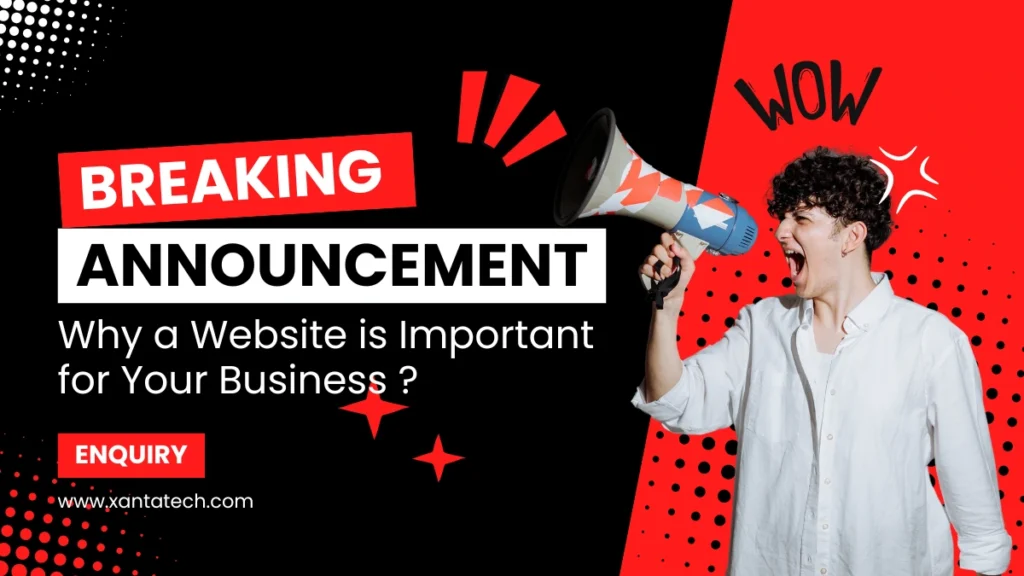Why a Website is Important for Your Business: A Must-Have in Today’s Digital Age
In today’s fast-paced digital Era , having a website for your business is no longer optional—it’s essential and necessary need. Whether you run a small local business or a large enterprise, a website serves as the cornerstone of your online presence and plays a pivotal role in your overall success. With more than 4.9 billion people actively using the internet, it’s crucial for businesses to have an online platform that represents their brand and services effectively.
In this article, we’ll explore why having a website is so important for your business and how it can impact growth, customer trust, and overall profitability.
1. Establishes Online Presence
A website allows your business to be accessible online 24*7/365. Whether it’s during business hours or late at night, your potential customers can access your website at their convenience. It acts as an online storefront, showcasing your products or services even when you’re not physically available.
2. Builds Credibility and Trust
In today’s market, customers often look up businesses online before making a purchase decision. A well-designed, professional website can significantly boost your credibility. A business without a website might come across as outdated or untrustworthy to many potential customers. Conversely, a website with clear information, customer testimonials, and quality content helps build trust and authority in your field.
3. Cost-Effective Marketing
A website acts as a powerful marketing tool that’s far more affordable than traditional advertising methods. With the right SEO (Search Engine Optimization) strategies, you can drive organic traffic to your website without spending on expensive advertisements. Additionally, integrating your site with social media and email campaigns can broaden your reach while keeping costs low.
4. Enhances Customer Convenience
Customers want quick and easy access to information. A website provides an easy way for potential customers to learn about your business, compare products or services, and even make purchases without stepping into a physical store. Features like online booking, product catalogs, and contact forms enhance the user experience and help your business run smoothly.
5. Expands Your Reach
A physical store is limited by location, but a website breaks those boundaries. With an online presence worldwide, you can reach a global audience. This is especially important for e-commerce businesses, but even local service providers can expand their reach through search engine visibility and targeted online marketing.
6. Provides Valuable Insights
A website offers analytical data that can help you understand customer behavior. With tools like Google Analytics, you can track who is visiting your site, what pages they’re interested in, how long they stay, and what actions they take. This data is invaluable for refining your marketing strategy and improving customer engagement.
7. Competitive Advantage
In many industries, not having a website puts you at a disadvantage compared to competitors who are already online. Businesses that invest in a strong online presence are often seen as more reliable and accessible, making them more appealing to customers. Without a website, you risk being overshadowed by the competition.
8. Facilitates Business Growth
Your website can act as a hub for scaling your business. Whether you’re expanding your product line, offering new services, or entering new markets, your website serves as the platform to showcase these updates. With e-commerce integration, you can even automate sales, inventory management, and customer service, freeing up time to focus on growth.
FAQs: Why Having a Website Is Essential for Business
Q1: Can social media replace a website? While social media is a great tool for engagement and visibility, it doesn’t offer the same level of control and flexibility that a website does. A website serves as your permanent online hub, allowing for custom designs, SEO optimization, and the ability to fully showcase your brand without the limitations of a social media platform.
Q2: How much does a website cost to maintain? The cost of maintaining a website can vary depending on its size and complexity. Basic websites require minimal upkeep, mainly hosting fees and domain renewal, while more complex sites may need regular updates, security patches, and content management. Overall, maintaining a website is often much more cost-effective than traditional marketing methods.
Q3: What kind of businesses benefit from having a website? All types of businesses benefit from having a website, whether you’re running a small local shop or a global corporation. Even service-based businesses, such as plumbers, lawyers, and consultants, can use websites to attract more customers, provide information, and build credibility.
Q4: How does SEO benefit my website? Search Engine Optimization(SEO), helps your website rank higher on search engine results pages (SERPs). A well-optimized site can attract more organic traffic, meaning more potential customers will find your business without you having to pay for advertisements. SEO is a long-term strategy that, when done right, provides ongoing benefits.
Q5: Is it difficult to build a website? With today’s technology, building a website is more accessible than ever. Many platforms, like WordPress or Wix, offer user-friendly tools that don’t require extensive coding knowledge. For businesses looking for something more custom, professional web development services are available to create a site tailored to your specific needs.
Q6: What should I include on my business website? Your website should include essential information such as your company’s services or products, contact information, and an About Us page. For businesses selling products online, a functional e-commerce platform is crucial. Testimonials, a blog for SEO, and clear calls-to-action (CTAs) also add value and encourage user engagement.
Conclusion
In the digital age, having a website is indispensable for any business looking to grow, build trust, and stay competitive. A well-maintained website can act as your best marketing tool, enhancing your online presence, driving traffic, and ultimately increasing revenue. Whether you’re a small business or a large enterprise, investing in a high-quality website is key to long-term success.
Having a website is no longer just an option—it’s a necessity for thriving in today’s online marketplace.

